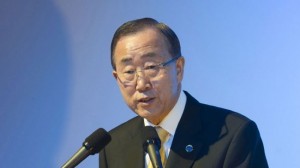 (Reuters) - U.N. Secretary-General Ban Ki-moon on Thursday commended efforts by Iranian President Hassan Rouhani's government to engage with the international community and praised Tehran for releasing several prominent prisoners.
(Reuters) - U.N. Secretary-General Ban Ki-moon on Thursday commended efforts by Iranian President Hassan Rouhani's government to engage with the international community and praised Tehran for releasing several prominent prisoners.
Ban met with Iranian Foreign Minister Javad Zarif earlier on Thursday and said he plans to meet with Rouhani on the sidelines of the U.N. General Assembly in New York next week. Rouhani is due to address the United Nations on Tuesday.
Since Rouhani was elected president in June, the centrist cleric has called for "constructive interaction" with the world, a dramatic shift in tone from the strident anti-Western rhetoric of his predecessor, Mahmoud Ahmadinejad.
"I told Minister Zarif that I commend the efforts of the new government in Iran in promoting dialogue with the international community," Ban told reporters. "I'm going to meet President Rouhani next week ... (to) discuss all the matters of regional concern very closely."
The United States and its allies suspect Iran is seeking nuclear bomb-making capability despite Tehran's insistence that its atomic program has only peaceful aims. Tough sanctions imposed by Washington and the United Nations over the issue have taken a severe toll on Iran's economy.
Rouhani vowed on Wednesday that his government would never develop nuclear weapons, his strongest signal yet that he may be seeking a diplomatic thaw with the West after decades of acrimony.
Ban said he had also praised the Iranian government for releasing 12 political prisoners, including human rights lawyer Nasrin Sotoudeh and a number of women's rights activists, political activists and journalists.
"When I visited Iran last year I raised this issue and discussed it with them and urged them to release all these people. I am glad they have finally taken action," Ban said.
In a tentative sign that hardline policies are being eased in Iran, authorities freed Sotoudeh and at least 10 other prominent prisoners on Tuesday and Wednesday, according to reports on opposition websites.
By Reuters
The Iran Project is not responsible for the content of quoted articles.

 QR code
QR code